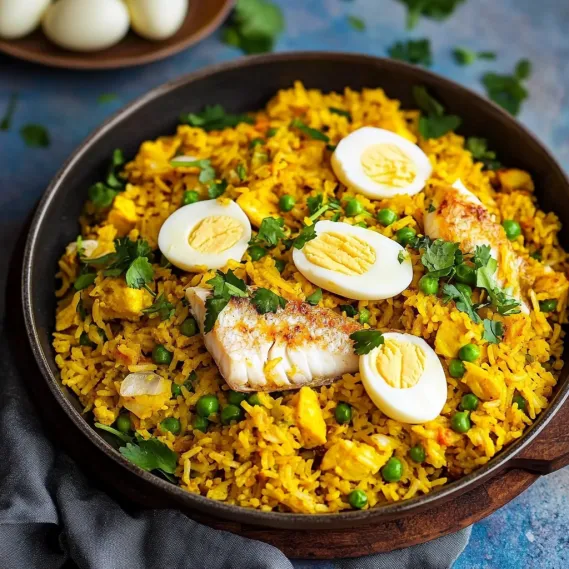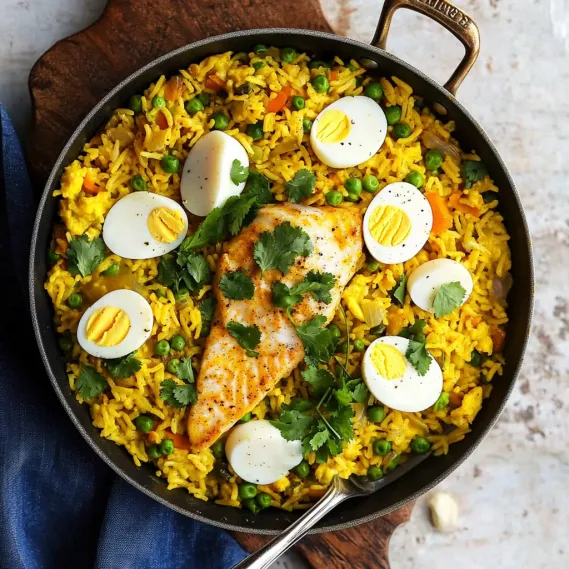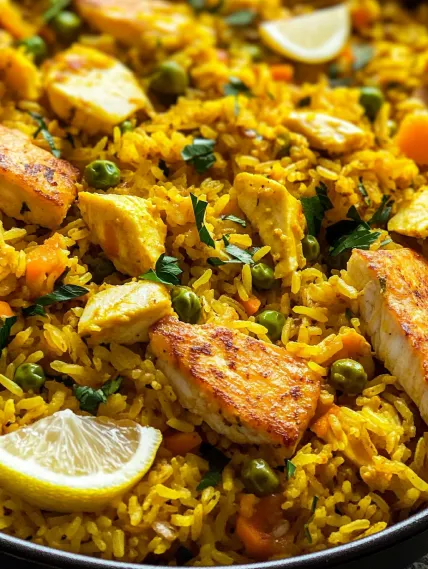 Pin
Pin
This hearty Kedgeree has become my weekend brunch tradition, bringing a touch of British colonial fusion to my family table. The combination of flaky smoked fish, aromatic curry-spiced rice, and perfectly boiled eggs creates a satisfying one-dish meal that manages to be both comforting and exotic.
I first discovered Kedgeree during a rainy weekend in London, served at a charming bed and breakfast. The proprietor shared her family recipe, and I've been perfecting my version ever since. It's now my go-to dish when hosting brunch gatherings.
Ingredients
- Smoked haddock or cod: Offers the authentic backbone of this dish with its rich umami flavor
- Long grain rice: Creates the perfect fluffy texture that absorbs all the aromatic spices
- Butter: Provides luxurious richness that binds all flavors together
- Curry leaves: Add an authentic aromatic element that elevates the dish beyond basic curry powder
- Cardamom pods: Release their unique citrusy warmth when gently crushed
- Brown onion: Creates the sweet foundation of the spice mixture
- Garlic: Adds essential depth to the aromatics
- Curry powder: Brings warm complexity without overwhelming heat
- Turmeric: Provides the signature golden color and earthy notes
- Frozen peas: Add bright color and sweet bursts of freshness
- Hard boiled eggs: Create a creamy contrast to the spiced rice
- Fresh coriander: Brightens the entire dish with herbal freshness
How To Make Kedgeree
- Poach the Fish:
- Begin by bringing chicken stock to a gentle boil in a large saucepan. Place the smoked fish into the hot liquid, ensuring it's mostly submerged. Reduce heat until the surface barely ripples. Poach gently for 8 minutes until the fish flakes easily when tested with a fork. The slow poaching preserves the delicate texture while allowing the fish to infuse the stock with flavor.
- Prepare the Fish:
- Once the fish is cooked, transfer it to a plate to cool slightly. When manageable, use your fingers or a butter knife to carefully remove and discard the skin. Gently flake the fish into large chunks, being careful to maintain some integrity in the pieces. Check thoroughly for any bones that might remain. Set aside while preparing the rice.
- Cook the Rice:
- Reserve a half cup of the fish poaching liquid and set aside. Add the uncooked rice directly to the remaining poaching liquid in the same saucepan. Bring to a simmer over high heat, then cover with a tight-fitting lid and reduce heat to low. Cook undisturbed for exactly 13 minutes. The rice will absorb the flavorful stock, creating the foundation of your dish.
- Rest the Rice:
- Remove the saucepan from heat without removing the lid. Allow the rice to steam and finish cooking in its residual heat for 10 minutes. This crucial resting period ensures perfectly cooked, fluffy rice. After resting, gently fluff the rice with a rubber spatula to separate the grains without breaking them.
- Create the Curry Base:
- While the rice rests, melt butter in a very large skillet over medium-high heat. Add cardamom pods and curry leaves, stirring for 30 seconds until their aromas are released. Add diced onion and minced garlic, sautéing for 5 minutes until the edges begin to brown. Stir regularly to prevent burning while developing deep flavor.
- Spice the Rice:
- Reduce heat to medium and add curry powder and turmeric to the butter mixture, stirring quickly to bloom the spices. Immediately add the cooked rice and toss until every grain is coated with the aromatic butter and uniformly yellow. Pour the reserved poaching liquid over the rice and toss to incorporate. This additional moisture will create the perfect texture.
- Combine the Elements:
- Taste the rice and adjust seasoning if needed. Fold in thawed peas and most of the chopped coriander, reserving some for garnish. Finally, gently incorporate the flaked fish, taking care not to break the chunks too much. The goal is to distribute the fish throughout while maintaining visible pieces.
- Present and Serve:
- Transfer the Kedgeree to a large serving platter or individual plates. Top with halved or quartered hard-boiled eggs and sprinkle with the reserved coriander. Serve immediately while hot.

My favorite element of this dish is the butter-bloomed spices that coat each grain of rice. The first time I served this to my British friend James, he closed his eyes and said it transported him straight back to his grandmother's kitchen in Yorkshire. That moment solidified Kedgeree as a permanent fixture in my cooking repertoire.
Storage and Reheating
Kedgeree stores beautifully in the refrigerator for up to 3 days in an airtight container. The flavors actually continue to develop overnight, making it a perfect make-ahead dish. When reheating, add a small splash of water or stock to prevent drying, then warm gently in a covered skillet over medium-low heat. Alternatively, microwave with a damp paper towel over the top to maintain moisture. For best results, store any remaining hard-boiled eggs separately and add them only when reheating.

Fish Substitutions
While traditional Kedgeree calls for smoked haddock or cod, this versatile dish adapts beautifully to other options. Smoked trout or salmon work wonderfully, offering a richer flavor profile. For a non-smoked alternative, poach fresh white fish in the stock with a teaspoon of smoked paprika added for depth. In a pinch, even good quality canned tuna can be folded in after the rice is cooked. Regardless of which fish you choose, the key is to maintain large flakes for textural interest throughout the dish.
Serving Suggestions
Serve Kedgeree as a complete meal on its own or with simple accompaniments that complement its rich flavors. A side of cooling cucumber raita or yogurt cuts through the warmth of the spices beautifully. For a more substantial meal, offer warm naan bread or buttered toast alongside. A simple green salad dressed with lemon vinaigrette provides fresh contrast. For a traditional British touch, serve with mango chutney and poppadoms for an authentic Anglo-Indian experience.
History of Kedgeree
Kedgeree represents the fascinating culinary exchange between Britain and India during colonial times. Originally derived from the Indian dish "khichdi" a simple rice and lentil preparation, returning British colonials adapted it to their tastes by adding smoked fish. By Victorian times, it had become a breakfast staple in wealthy British households, often served as the first course at elaborate country house breakfasts. The dish perfectly exemplifies how global influences have shaped British cuisine over centuries, creating something entirely new that honors both culinary traditions.
Recipe FAQs
- → What type of fish is best for kedgeree?
Traditionally, smoked haddock or cod is used for kedgeree. However, other smoked fish like salmon or trout work as tasty alternatives.
- → Can I make kedgeree without curry leaves?
Yes, curry leaves add an extra layer of flavor, but you can omit them or substitute with bay leaves for a milder taste.
- → What is the purpose of poaching the fish?
Poaching the fish in stock ensures it remains tender and moist, while also infusing delicious flavor into the cooking liquid used for the rice.
- → Can I prepare kedgeree ahead of time?
Yes, kedgeree can be prepared in advance. Reheat gently with a splash of stock or water to maintain moisture and flavor.
- → Are there vegetarian alternatives for kedgeree?
To make a vegetarian version, substitute smoked fish with smoked tofu or roasted vegetables, and use vegetable stock instead of chicken stock.
- → How do you prevent the rice from becoming mushy?
Ensure you cook the rice on low heat, let it rest covered, and fluff it with a spatula before mixing it with other ingredients.
